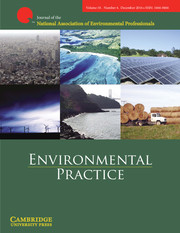No CrossRef data available.
Article contents
Ethical Issues in Brownfields
Published online by Cambridge University Press: 19 August 2005
Extract
When the editors announced that there would be a special issue on brownfields they indicated that it might be a good idea to have an ethics editorial on brownfield–related challenges. I pulled out my notes taken during the time that “the brownfield solution” was just beginning to be formulated in the early 1990s. The whole program stemmed from a bad situation created by good inten- tions. The intention to clean up polluted areas affected the landowner, the property sold at tax auction, and the unwitting investor: huge expenses were involved, and there was an economic inability to deal with past choices of correction. The selected solution was to redefine environmental regulations where a full cleanup might not have any tangible ecological or health benefits. The classic argument was that if it was acceptable to cap a landfill, why did a person need to dig up a parking lot to remove chemicals already well sequestered in the ground below? The pollutants were doing little to no damage where they were. Leave them alone.
- Type
- POINTS OF VIEW
- Information
- Copyright
- © 2003 National Association for Environmental Professionals




